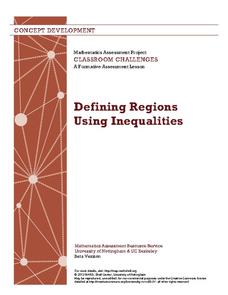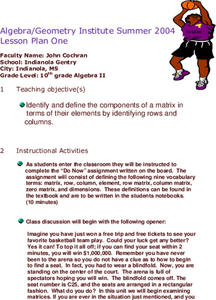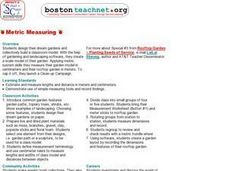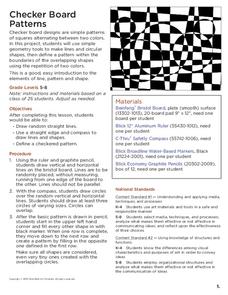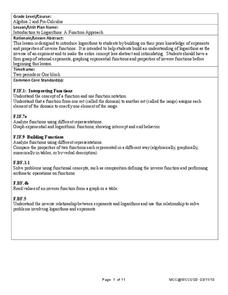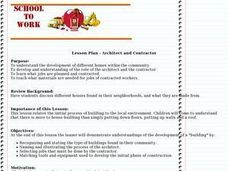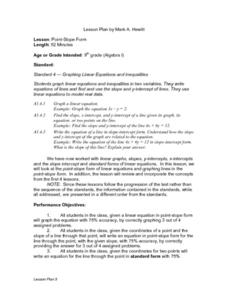Curated OER
Design Space
Students will develop an understanding design space. The arrangement of shapes is taught to create simple perspective. The differences in the size of shapes is shown in order to help learners see how they should be arranged in...
MARS, Shell Center, University of Nottingham
Defining Regions Using Inequalities
Your young graphers will collaboratively play their way to a better understanding of the solution set produced by the combining of inequalities. Cooperation and communication are emphasized by the teacher asking questions to guide the...
Curated OER
I. M. Pei and the Geometry of the NGA
Students compare design elements in neoclassical and modern architecture. They review knowledge of triangles and quadrilaterals and design a geometric pattern using Pei's polygons They create a city plan using a variety of lines and...
Curated OER
Symmetry in Kaleidoscope Designs
Students define reflection, rotation and symmetry. In this symmetry lesson, students move the graph around the coordinate plane and identify the line of symmetry. They identify the different designs of a kaleidoscope.
Curated OER
Designing the Perfect Science Fair Project Webquest
Sixth graders examine the Scientific Method and define their topic of interest. Students familiarize themselves with how to utilize their resources and create note cards. Students create their written report and display of their...
Curated OER
Matrices
Students explore matrices. Given a particular situation, they discover the make-up and design of a matrix. Students identify examples of rectangular arrays used in real world situations. They solve oral problems in class.
Curated OER
Nickels, History, and Peace
Second graders examine the designs on nickels before 2004 and after when the new Peace Medal nickel was minted. They research the events that preceded the new design and explore the symbols of friendship on the new coin. They work in...
Curated OER
Tessellmaniacs
Seventh graders create 3 original tessellation using polygons. They slide, turn, rotate and glide their designs on the computer. They print their tessellation on a T-shirt and teach the 6th graders about tessellations.
EngageNY
Integer Sequences—Should You Believe in Patterns?
Help your class discover possible patterns in a sequence of numbers and then write an equation with a lesson plan that covers sequence notation and function notation. Graphs are used to represent the number patterns.
Curated OER
Scientific Graphs
Students organize data collected from their experiments using graphs. In this statistics and biology lesson, students organize their scientific data from an article into readable graphs. They define the usefulness of their graph and...
Curated OER
Metric Measuring
Students design their dream gardens and work together to build a class model. They use software to create a virtual model. They only use metric measurements.
Curated OER
Graph Paper Patterns
Young artists divide a piece of graph paper into sections using rectangles, squares, and triangles. They then fill each section with patterns of shape and color. Elementary graders describe how their patterns are organized. Secondary...
Mathematics Vision Project
Module 6: Congruence, Construction, and Proof
Trace the links between a variety of math concepts in this far-reaching unit. Ideas that seem very different on the outset (like the distance formula and rigid transformations) come together in very natural and logical ways. This...
Curated OER
Checker Board Patterns
Make these funky checker board patterns. They will not only add fun decoration to your classroom, but your pupils will be able to practice using simple geometry tools.They will use tools to make lines and circular shapes using a ruler,...
West Contra Costa Unified School District
Introduction to Inverse Functions
Ready to share the beauty of the inverse function with your classes? This algebra II lesson guides the discovery of an inverse function through a numerical, graphical, and an algebraic approach. Connections are made between the three,...
West Contra Costa Unified School District
Introduction to Logarithms
Build on pupils' understanding of inverse functions by connecting logarithmic functions to exponential functions. This activity allows individuals to see graphically the inverse relationship between an exponential and logarithmic...
Kenan Fellows
Isotopic Pennies
Many people confuse atomic mass and atomic numbers. The sixth of seven lessons in a unit requires scholars to find the weight of different groups of pennies. Then, they must solve how many of each type of penny exists in a closed system...
Inside Mathematics
Swimming Pool
Swimming is more fun with quantities. The short assessment task encompasses finding the volume of a trapezoidal prism using an understanding of quantities. Individuals make a connection to the rate of which the pool is filled with a...
EngageNY
The Graph of a Function
Mathematics set notation can be represented through a computer program loop. Making the connection to a computer program loop helps pupils see the process that set notation describes. The activity allows for different types domain and...
Inside Mathematics
Winning Spinners
Winning a spin game is random chance, right? Pupils create a table to determine the sample space of spinning two spinners. Individuals determine the probability of winning a game and then modify the spinners to increase the probability...
Curated OER
Creating and Destroying Symmetry
Students study the types of symmetry that appear in different basketball symbols. They point out changes that rotate symmetry from one type to another.
Curated OER
Architect and Contractor
Students recognize and state the type of buidings found in their community. They name and illustrate the process of the architect. They match tools and equipment used to develop the initial phase of construction.
Curated OER
Point-Slope Form
Ninth graders explore the point-slope form of linear equations and graph lines in the point-slope form. After completing the point-slope equation, they identify the slope of a line through a particular point. Students explain the...

